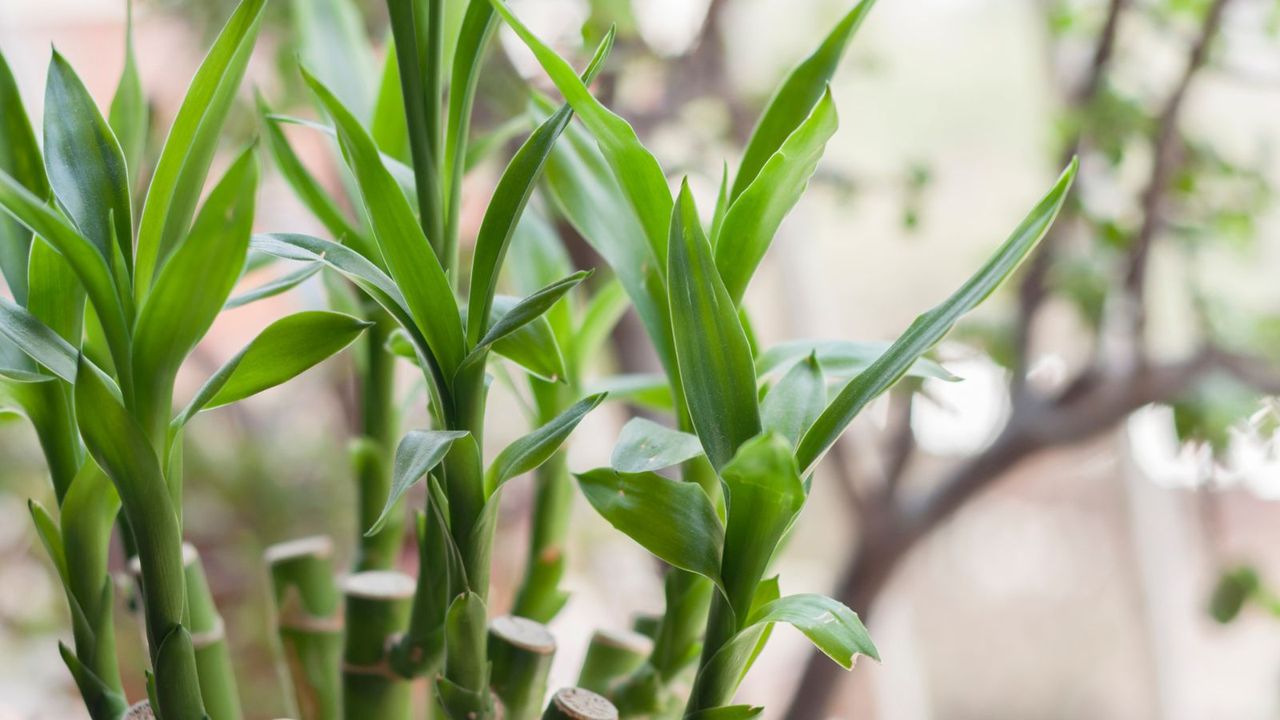How to propagate lucky bamboo – grow new plants for your home
Yes, lucky bamboo can be propagated from a cutting. Discover how to do it with our expert guide


Invest just a little time and effort into propagating a lucky bamboo you already have among your houseplants and you can enjoy new plants that boost the greenery in your interiors. In feng shui the plant is an auspicious one, so it also makes a great gift.
Despite its name, lucky bamboo (Dracaena sanderiana and related varieties) isn’t a bamboo, although it does grow fast. Like all the best indoor plants it brings the beauty of nature inside, and the intricate shapes into which lucky bamboo can be trained make it a particularly attention-grabbing choice.
Propagating lucky bamboo from your existing plant isn’t difficult and, even without the training that creates the striking shapes, the straight stems and narrow leaves make extra plants appealing. This is how to do it.
Discover how to propagate lucky bamboo
Propagating a fiddle leaf fig or propagating a monstera can provide you with more indoor plants cost free providing you avoid the classic houseplant propagation mistakes, and the same goes for lucky bamboo. Learning how will enlarge your houseplant collection.
Other than being one of the easiest feng shui plants to grow, ‘Propagating lucky bamboo is pretty straightforward,’ says plant expert Stephen Webb of Garden’s Whisper. ‘Lucky bamboo isn't actually bamboo – it’s a type of Dracaena. But no matter, it propagates just as easily as its name implies.’
Use these steps to propagate lucky bamboo.
Take a cutting
Taking a cutting from lucky bamboo is straightforward. ‘Choose a healthy stalk with a long offshoot,’ explains indoor plant expert Vladan Nikolic of Mr Houseplant. ‘Ideally, the offshoot should have at least two growth nodes. Cut the offshoot using sterilized pruning shears. Cut as close as possible to the parent stalk. Remove the bottom leaves from the offshoot. Leave at least one set of leaves on top of the cutting.’
Once you’ve taken the cutting, you have the option to grow it in soil or grow it in water.
Grow in soil
Growing a lucky bamboo cutting in soil has both advantages and disadvantages. ‘There’s no risk of a cutting dying during the transition from water to the soil, as you’re propagating directly in the soil,’ explains Vladan Nikolic.
The downsides? ‘It takes more effort, as you need to water more frequently, and monitor humidity,’ he says. ‘And it’s more difficult to get the watering just right – not too often, not too rare. You should have a good potting medium, porous, with oxygen.’
Follow these steps from Vladan to propagate lucky bamboo in soil.
- If you want to speed up the process and increase the chances of successful propagation you can dip the cutting into rooting hormone.
- Plant the cutting in a pot with drainage holes filled with a well-draining potting mix.
- Push the stem into the soil to make it stable, so that it can stand upright on its own.
- Place the pot in a spot that gets plenty of bright, indirect light.
- Water the cutting.
- Keep the soil moist until the cutting grows 2 inches of roots, then reduce watering – water once the top few inches of the soil have dried out.
Grow in water
Lucky bamboo can alternatively be propagated in water. Just like propagating in soil there are pros and cons. ‘It’s easier (no need to think about watering, no need to think about humidity), especially for people new to plants,’ says Vladan Nikolic.
A negative is the ‘risk of a cutting dying when transitioned into soil’, he says.
To propagate in water use this guide from Vladan.
- Fill a jar or a glass with water.
- Place the cutting in the water making sure that its cut end is submerged, as well as one or two nodes, but the leaves shouldn’t touch the water surface.
- Put the jar in a location with plenty of bright, indirect light.
- Change the water weekly or more often if it gets dirty.
- Depending on your preference, you can continue growing your lucky bamboo in water or you can transfer it into soil once the roots are 2 to 3 inches long.
FAQs
How long does lucky bamboo take to form roots?
You’ll need to give lucky bamboo time to form roots when you’re propagating. ‘Lucky bamboo can take anywhere from two to six weeks to form roots, depending on whether you propagate it in soil or water,’ says plant expert Stephen Webb of Garden’s Whisper.
‘If you propagate it in soil, expect it to take longer – maybe four to six weeks – until you see some decent root growth. The soil helps anchor the cutting, but it’s slower for the roots to push through. Just make sure the soil stays moist but not soggy.’
‘However, propagating in water often speeds things up. Typically you’ll see small roots emerging in two to four weeks. The water allows the roots to grow more freely without resistance from the soil. Plus, you can watch the roots grow, which is pretty neat.’
Can you leave lucky bamboo in water?
Lucky bamboo can be left in water, or it can be grown in soil. However, bottled, filtered or distilled water are typically preferable for the plant. The chlorine in tap water can harm it, so if you do use it, leave the water to stand for 24 hours beforehand so the chlorine can evaporate. Tap water with high levels of fluoride shouldn’t be used. The roots of a lucky bamboo in water should be covered – think around 2 inches depth.
Propagating lucky bamboo can be fun as well as money-saving. Bear in mind that your new plant won’t look like the one you took cuttings from at the start. ‘The new stems will at first be thin, and it could take several months or even years for the stems to harden and become thick and woody, like the stems of the parent plant,’ says indoor plant expert Vladan Nikolic. After that, bamboo care is pretty straightforward.
Sign up to the Homes & Gardens newsletter
Design expertise in your inbox – from inspiring decorating ideas and beautiful celebrity homes to practical gardening advice and shopping round-ups.

Sarah is a freelance journalist and editor. Previously executive editor of Ideal Home, she’s specialized in interiors, property and gardens for over 20 years, and covers interior design, house design, gardens, and cleaning and organizing a home for Homes & Gardens. She’s written for websites, including Houzz, Channel 4’s flagship website, 4Homes, and Future’s T3; national newspapers, including The Guardian; and magazines including Future’s Country Homes & Interiors, Homebuilding & Renovating, Period Living, and Style at Home, as well as House Beautiful, Good Homes, Grand Designs, Homes & Antiques, LandLove and The English Home among others. It’s no big surprise that she likes to put what she writes about into practice, and is a serial house renovator.
-
 5 low-energy and useful tasks to try instead of doom-scrolling – this brain hack will break bad habits
5 low-energy and useful tasks to try instead of doom-scrolling – this brain hack will break bad habitsExperts urge you to try it for your wellbeing
By Chiana Dickson Published
-
 Want the best home-grown tomatoes ever? Plant them with marigolds, says our grow-your-own expert, and discover why these two are a dream combination
Want the best home-grown tomatoes ever? Plant them with marigolds, says our grow-your-own expert, and discover why these two are a dream combinationYour tomato plants will be pest-free and covered in fruits
By Drew Swainston Published